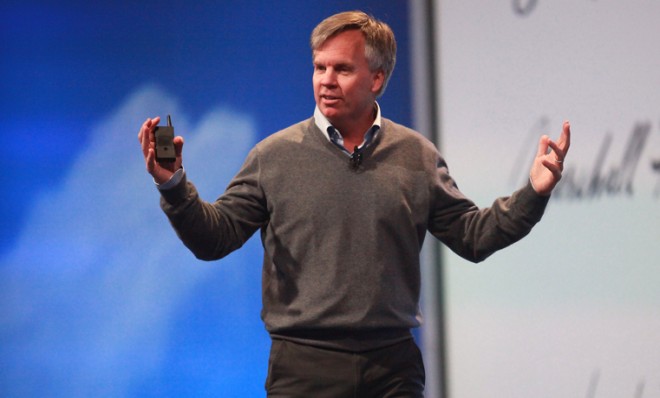Who's responsible for JC Penney's failures? 3 candidates
With the resignation of Bill Ackman, the blame is being spread around once more

A free daily email with the biggest news stories of the day – and the best features from TheWeek.com
You are now subscribed
Your newsletter sign-up was successful
Following a much-publicized scuffle last week, hedge fund manager cum activist investor Bill Ackman resigned Tuesday morning from JC Penney's board, ending a three-year relationship that has been wrought with conflict over how the discount retailer can reverse a years-long slide.
"During my time on the JC Penney Board of Directors, I have always advocated for what I believe to be in the best interests of the Company — its stockholders, employees and others," said Ackman in a statement. "At this time, I believe that the addition of two new directors and my stepping down from the Board is the most constructive way forward for JC Penney and all other parties involved."
Ackman's departure may feel like a welcome change for board members, particularly Chairman Thomas Engibous, whom Ackman had publicly accused of incompetence and cronyism. In particular, Ackman had insisted that JC Penney move more swiftly in hiring a new CEO.
The Week
Escape your echo chamber. Get the facts behind the news, plus analysis from multiple perspectives.

Sign up for The Week's Free Newsletters
From our morning news briefing to a weekly Good News Newsletter, get the best of The Week delivered directly to your inbox.
From our morning news briefing to a weekly Good News Newsletter, get the best of The Week delivered directly to your inbox.
But will shuffling the decks yet again fix Penney's core problems? The retailer has a history of pointing fingers when the going gets tough.
Here, three people who have taken blame for Penney's shortcomings.
Michael Francis
In June of 2012, Penney's head of marketing and merchandising abruptly left the company after just nine months on the job. The move followed a failed marketing campaign, involved a commercial showing angry customers who had had it up to here with coupons and sales. The campaign was part of changes put in place by then-CEO Ron Johnson, who set out to "simplify" pricing by removing sales and coupons, which had long been a pillar of Penney's identity.
A free daily email with the biggest news stories of the day – and the best features from TheWeek.com
The strategy backfired big-time. According to Stacey Widlitz at CNBC, the campaign "sent confused customers in to the arms of competitors."
"Johnson may have felt the need to clear the decks," she wrote. "Was Francis to blame or was he a convenient scapegoat?"
Ron Johnson
Less than one year later, it was Johnson's turn.
No one has taken more blame for Penney's failures than Johnson, a respected veteran of the retail world who famously helped launch Apple's line of gleaming white stores. Johnson wasted no time setting in motion a series of bold moves at Penney: Abolishing coupons and sales, introducing a store-within-a-store initiative, and announcing that checkout counters would be eliminated by 2014.
The outcome of his efforts ranged from meaningless (those checkout counters are still around), to disastrous (customers fled from Penney's sale-less racks). Under Johnson's reign, the company lost a billion dollars.
The press eviscerated him. ("Ron Johnson's JC Penney: The Anatomy of a Retail Failure" is a typical headline from the time.) But it's easy to forget what shape the company was in when he inherited it: "Directionless and barely profitable," as James Surowiecki put it in The New Yorker shortly before Johnson was ousted in April.
One study found that efforts at merely getting a money-losing retailer back to profitability succeed only thirty per cent of the time. Radically remaking a major company, as Johnson is trying to do, is even harder. So, if Johnson isn’t as good as he looked at Apple, he’s probably not as bad as he looks at Penney. Indeed, his biggest mistake may simply have been taking the job in the first place. [The New Yorker]
Bill Ackman
Which brings us to the man of the hour, Bill Ackman, who rallied behind Ron Johnson's hire in 2011, then publicly fought the board's choices following his removal. Last week, members of the board, as well as Starbucks CEO Howard Schultz, were quick to remind the public that Ackman was to blame for Johnson. But as Rocco Pendola at The Street puts it:
We can blame Ackman for Ron Johnson and, subsequently, JCP's failures all we want, but don't pin the carnage on one man's influence, as poisonous as it appears. Find one person who questioned JCP's decision to poach Johnson from Apple...
At JCP, the same culture of obviousness that dogs sterile retailers such as Best Buy, even as some of their stocks head-fake us, will mire JCP in irrelevancy. The company is, apparently, looking for a permanent CEO to replace the interim Mike Ullman. This is encouraging. But JCP cannot pull a Best Buy or we're in for more of the same. [The Street]
But let's not count Ackman out quite yet. Here's Laura Heller at Forbes:
Except that Ackman hasn’t sold his shares. He is still Penney’s largest shareholder with a 17.74% stake in the company through his Pershing Square Capital Management. Anyone think he’s really done trying to manage Penney? [Forbes]
Carmel Lobello is the business editor at TheWeek.com. Previously, she was an editor at DeathandTaxesMag.com.
-
 How the FCC’s ‘equal time’ rule works
How the FCC’s ‘equal time’ rule worksIn the Spotlight The law is at the heart of the Colbert-CBS conflict
-
 What is the endgame in the DHS shutdown?
What is the endgame in the DHS shutdown?Today’s Big Question Democrats want to rein in ICE’s immigration crackdown
-
 ‘Poor time management isn’t just an inconvenience’
‘Poor time management isn’t just an inconvenience’Instant Opinion Opinion, comment and editorials of the day